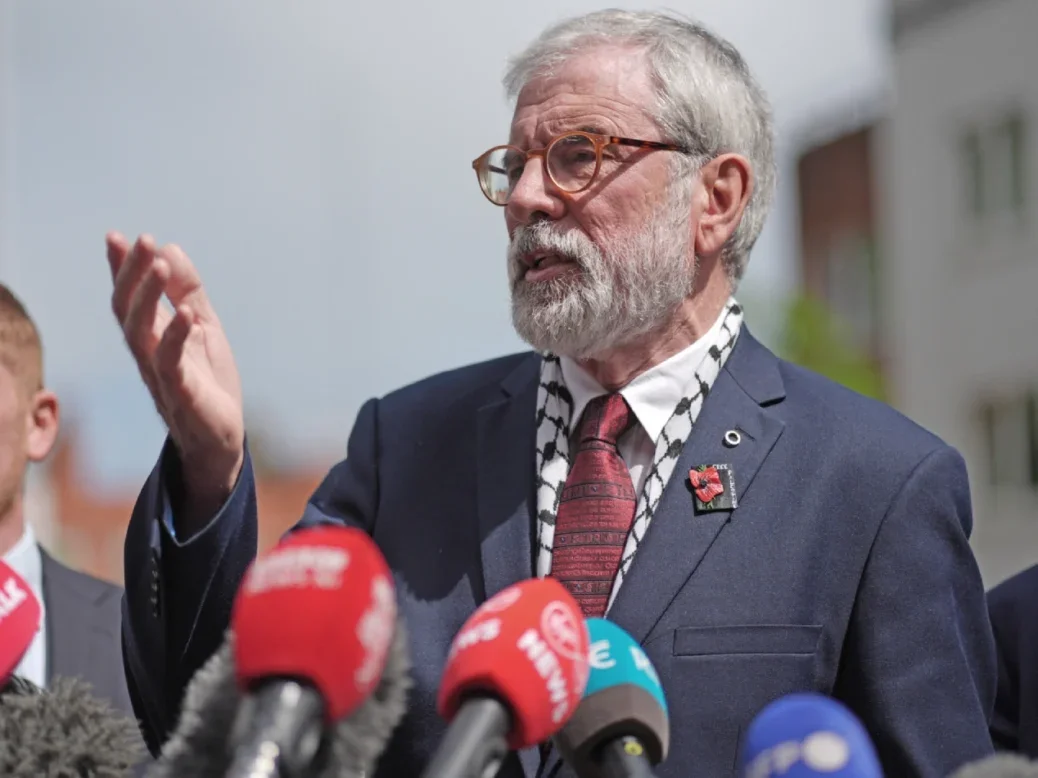
Former Sinn Fein leader Gerry Adams has been awarded €100,000 (£84,000) in damages after winning his libel action against the BBC.
Adams said that a BBC Spotlight programme, and an accompanying online story, defamed him by alleging he sanctioned the killing of former Sinn Fein official Denis Donaldson, for which he denies any involvement.
A jury at the High Court in Dublin found in his favour on Friday, after determining that was the meaning of words included in the programme and article.
The jury also found the BBC’s actions were not in good faith and that it had not acted in a fair and reasonable way.
Donaldson was shot dead in Co Donegal in 2006, months after admitting his role as a police and MI5 agent over 20 years.
In the programme broadcast in September 2016, an anonymous source given the pseudonym Martin claimed the shooting was sanctioned by the political and military leadership of the IRA and that Adams gave “the final say”.
In 2009, the dissident republican group the Real IRA claimed responsibility for the killing and a Garda investigation into the matter remains ongoing.
Adams said the allegation was a “grievous smear” while the BBC has described the legal action as a “cynical attempt to launder his reputation”.
The high-profile republican sought damages of at least €200,000 (£168,000) from the BBC, with his lawyers arguing that the defamation fell within the “very serious” or “exceptional” end of the scale.
However, the British public service broadcaster had argued it would be a “cruel joke” to award the former Sinn Fein president any damages and put forward the position that Adams had “no reputation at all”.
The jury determined that Adams should be awarded €100,000, which the jury heard falls on the medium scale for defamation.
They were tasked with determining whether the words in the BBC Spotlight programme and accompanying article, on which Adams brought the complaint, meant that he sanctioned and approved the murder of Donaldson.
Owens said they were to consider whether it was “more likely than not” that a “hypothetical reasonable reader” would take that meaning from the words.
The BBC had argued that the jury should not find that this was the meaning of the words, instead saying the claim had been put forward as an allegation that was immediately followed by Adams’ denial.
Having agreed with Adams on that point, they then had to consider whether the broadcaster’s actions were fair and reasonable as well as whether it acted in good faith.
They determined that the BBC had not acted in such a manner.
They returned with their verdict on Friday after six hours and 49 minutes of deliberations in total.
Speaking outside court, Gerry Adams, who spoke in both Irish and English, said taking this case was “about putting manners on the British Broadcasting Corporation”.
Adams told reporters: “I know many, many journalists. I like to think that I get on well with the most of them, and I wish you well, and I would uphold your right to do your job.
“But the British Broadcasting Corporation upholds the ethos of the British state in Ireland, and in my view it’s out of sync in many, many fronts with the Good Friday Agreement.
“It hasn’t caught on to where we are on this island as part of the process, the continuing process, of building peace and justice, and harmony, and, hopefully, in the time ahead, unity.”
BBC stands by decision to defend its journalism
Adam Smyth, director of BBC Northern Ireland, expressed disappointment in the outcome.
Speaking to media outside court, Smyth said: “We believe we supplied extensive evidence to the court of the careful editorial processes and journalistic diligence applied to this programme, and to the accompanying online article. Moreover, it was accepted by the court and conceded by Gerry Adams’ legal team that the Spotlight broadcast and publication were of the highest public interest.
“We didn’t want to come to court but it was important that we defend our journalism and we stand by that decision.
“Our past is difficult terrain for any jury and we thank them for their diligence and careful consideration of the issues in this case.
“The implications of their decision, though, are profound. As our legal team made clear, if the BBC’s case cannot be won under existing Irish defamation law, it is hard to see how anyone’s could, and they warned how today’s decision would hinder freedom of expression.
“Of course, a case of this importance, duration and complexity involves significant expense. In common with other media organisations, the BBC has insurance and makes financial provision for ongoing and anticipated legal claims.”
He added that the BBC will take some time to consider the implications of the ruling.
Email pged@pressgazette.co.uk to point out mistakes, provide story tips or send in a letter for publication on our "Letters Page" blog
